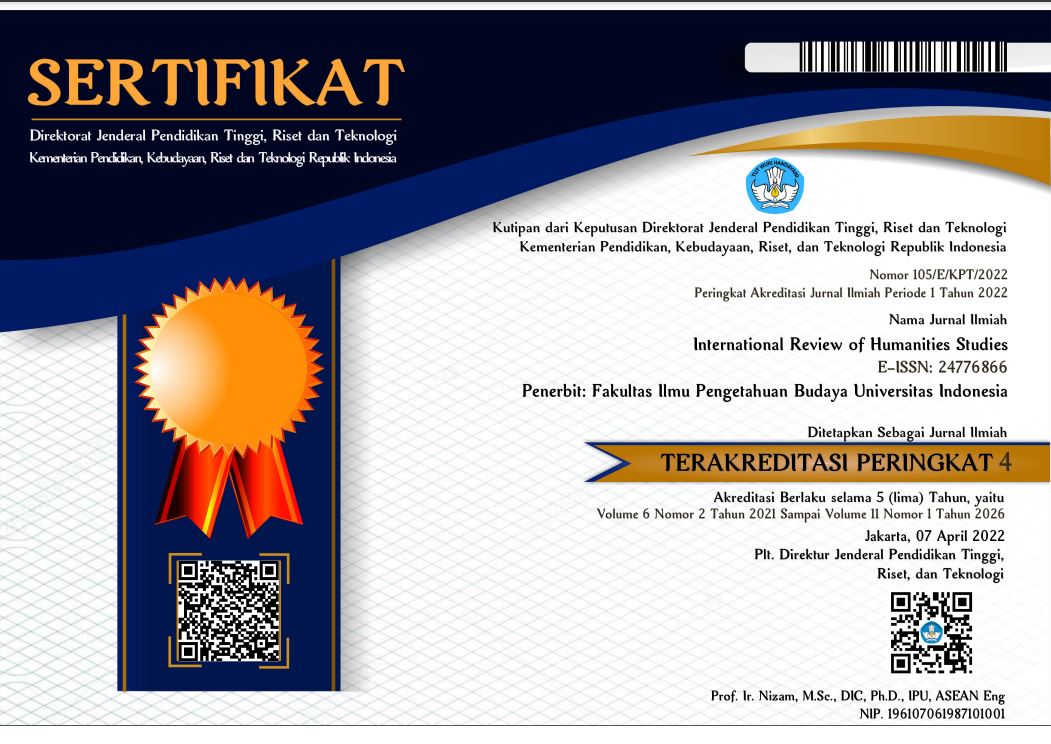International Review of Humanities Studies

Abstract
Discussions about Islamic women have been buzzing in Indonesia after the collapse of the New Order. Its presence directly contradicts the narratives of women that were influenced by western thought, such as liberalism and secularism, as well as by global islamization movement from the Middle East. The conflicts that arose were about the role of women in the public sphere, women's independence, women's bodies and sexuality. This study aims to find similarities between ideas about Islamic women and the practice of Islamic women's discourse in Indonesian society. This study uses an intrinsic study method and a sociology of literature approach to reveal the relationship of the text to social conditions in society. The result shows that the depiction of Islamic women in the four texts is the same as the practice of Islamic women's discourse that existed in Islamic societies even before Indonesia's independence. It is considered as a writing-back movement by Habiburrahman El Shirazy to propagate the majority version of Islamic values in Indonesia.
References
Ahmed, L. (2000). The Women of Islam. Dalam Transition, no. 83, hlm. 78-97. Indiana University Press. https://www.jstor.org/stable/3137476
Arnez, M. & Dewojati, C. (2010). Sexuality, Morality and the Female Role: Observations on Recent Indonesian Women’s Literature. On Asiatische Studien : Zeitschrift der Schweizerischen Asiengesellschaft. Bern : Internationaler Verlag der Wissenschaften. https://doi.org/10.5167/uzh-35186
Bachtiar, T.A. (2017). Pertarungan Pemikiran Islam di Indonesia: Kritik terhadap Islam Liberal dari H.M. Rasjidi sampai INSIST. Jakarta: Pustaka Al Kautsar.
Blackburn, S. (2008). Indonesian Women and Political Islam. On Journal of Southeast Asian Studies, vol. 39, no. 1, hlm. 83-105. Cambridge University Press. https://doi.org/10.1017/S0022463408000040
Damono, S.D. (1984). Sosiologi Sastra: Sebuah Pengantar Ringkas. Jakarta: Pusat Pembinaan dan Pengembangan Bahasa.
Doorn-Harder, P.V. (2006). Women Shaping Islam: Indonesian women reading the Quran. Chicago: University of Illinois Press.
Hellwig, T. (2003). Bercermin dalam Bayangan: Citra Perempuan dalam Sastra Indonesia. Translated by Rika Iffati Farikha. Depok: Desantara.
Kersten, C. (2018). Berebut Wacana: Pergulatan Wacana Umat Islam Indonesia Era Reformasi. Translated by M. Irsyad Rafsadie. Bandung: Mizan.
Khodafi, M. (2015). Dinamika Otoritas Ulama Perempuan Indonesia di Ruang Publik Kebangkitan Nyai dalam Komunitas Muslim Tradisional Nahdlatul Ulama). On Islam Indonesia Pasca Reformasi. Surabaya: Imtiyaz.
Madasari, O. (2019). Genealogi sastra Indonesia: Kapitalisme, Islam, dan sastra perlawanan. www.okkymadasari.net.
Porter, D. J. (2002). Managing Politics and Islam in Indonesia. London: Routledge Curzon.
Ramage, D. E. (2005). Politics in Indonesia: Democracy, Islam, and the ideology of tolerance. New York: Routledge.
Rasmussen, A. K. (2010). Women, the Recited Quran, and Islamic Music in Indonesia. California: University of California Press.
Robinson, K. (2009). Gender, Islam, and Democracy in Indonesia. New York: Routledge.
Srimulyani, E. (2012). Women from traditional islamic educational institution in Indonesia: Negotiating public space. Amsterdam University Press.
Steenbrink, K.A. (1986). Pesantren, Madrasah, Sekolah: Pendidikan Islam dalam Kurun Modern. Jakarta: LP3ES.
Suryakusuma, J. (2011). Ibuisme Negara: Konstruksi Sosial Keperempuanan Orde Baru. Depok: Komunitas Bambu.
Wellek, R. & Warren, A. (2014). Teori Kesusastraan. Translated by Melani Budianta. Jakarta: Gramedia.
Recommended Citation
Azhari, Dian Rizky; Yoesoef, M.; and Setyani, Turita Indah
(2023)
"LONG-STANDING NARRATIVE OF INDONESIAN ISLAMIC WOMEN IN FOUR NOVELS BY HABIBURRAHMAN EL SHIRAZY,"
International Review of Humanities Studies: Vol. 8:
No.
1, Article 10.
DOI: 10.7454/irhs.v8i1.1009
Available at:
https://scholarhub.ui.ac.id/irhs/vol8/iss1/10


